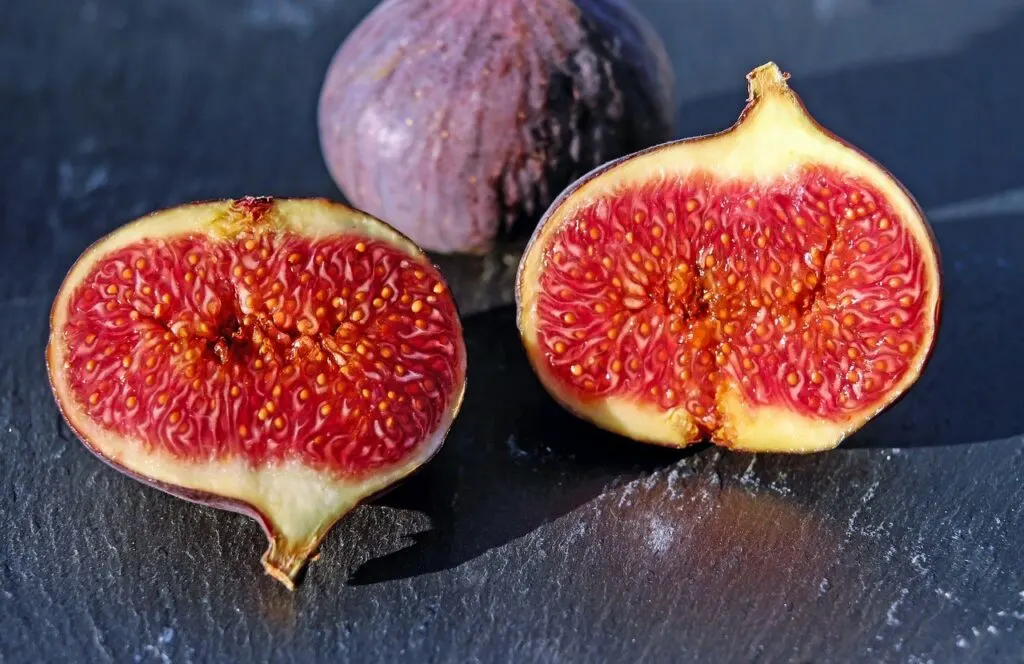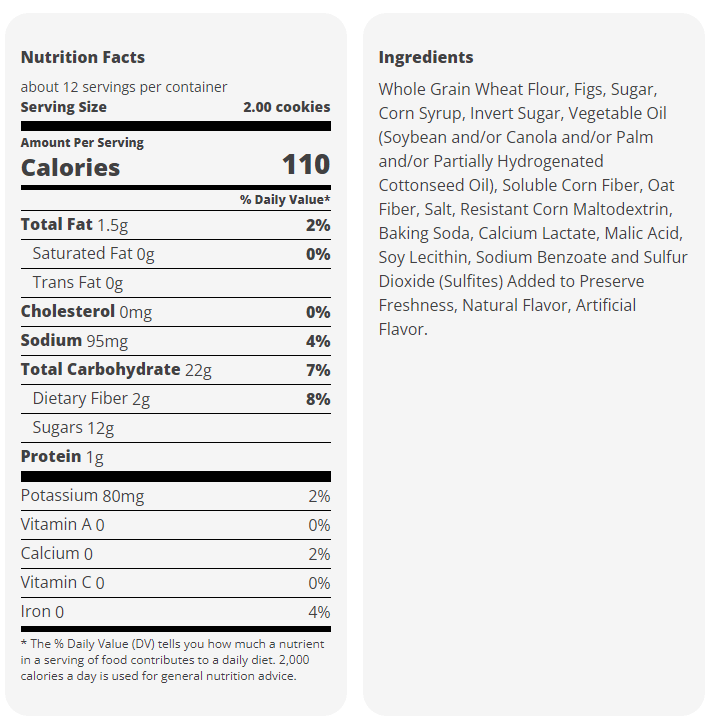Can Dogs Eat Fig Newtons
As dog owners, we constantly find ourselves wondering about the safety of various human foods for our furry friends. It is only natural that we want to make sure every treat we share with them is both enjoyable and harmless.
One such snack that may have crossed your mind is Fig Newtons — a delightful blend of fig paste and soft cookie dough. But can dogs eat Fig Newtons without any adverse effects? This article delves into the potential risks and benefits associated with feeding these fruity cookies to our canine companions.
Below, we examine various aspects of sharing Fig Newtons with your four-legged pal. From understanding the nutritional value of figs to identifying potential hazards associated with the cookie’s other ingredients, our aim is to provide you with the information needed to make an informed decision. So read on to discover if your beloved pet can safely enjoy a taste of this classic treat!
Key Takeaways:
- Figs are generally safe for dogs in moderation due to their fiber content and beneficial nutrients.
- Fig Newtons contain added sugars, which in excess can lead to obesity, dental issues, and diabetes in dogs.
- Some dogs may be allergic or sensitive to ingredients like wheat or additives found in Fig Newtons.
- The fig plant (Ficus) can be irritating to dogs, causing symptoms such as drooling and vomiting if ingested.
- Moderation is crucial when giving Fig Newtons to dogs, considering their size, weight, and activity level.

A Brief History of Fig Newtons
Fig Newtons were first introduced in 1891 by the Kennedy Biscuit Company, which later became part of Nabisco (a brand that also introduced Oreos, Animal Crackers, and Lorna Doones).
The cookies were named after the town of Newton, Massachusetts, where they were initially created. Over the years, these fruit-filled treats have become a staple in many households across the United States, and their popularity has continued to grow.
Newtons have evolved over time, with manufacturers now offering a variety of fruit flavors, like strawberry or triple berry, to cater to different tastes. Despite these changes, the sweet, jam-like fig paste remains the most well-liked version of this classic cookie, appealing to both children and adults.
Today, Fig Newtons are a popular snack known for their unique combination of flavors and textures. Naturally, some people may be eager to share this tasty treat with their dogs — after all, it’s only a soft and chewy cookie filled with a smooth fig paste.
But is it safe for canines?
Nutritional Breakdown: Figs and Dogs
When consumed in moderation, figs are generally not harmful to dogs. They are a good source of dietary fiber, which can help with digestion. They also contain beneficial nutrients, including vitamins A and C and potassium.
However, like any fruit, figs contain natural sugars, and too much sugar can be bad for dogs, leading to obesity and related health problems like diabetes. That’s why even with non-toxic fruits like figs, moderation is the key. A small piece as a rare treat is typically fine, but it should not become a staple in your dog’s diet.
Here, it’s essential to note that Fig Newtons are not filled with pure figs. Instead, they’re made with fig paste made from Black Mission figs and ingredients such as sugar and crumbled cookies (for texture and flavor).

The Potential Dangers of Added Sugars
One significant concern when feeding Fig Newtons to dogs is the presence of added sugars in the cookie dough. While dogs can process small amounts of sugar without any issues, consuming too much sugar can lead to obesity, dental problems, and even diabetes in some cases.
Furthermore, sugary treats like Fig Newtons can cause a rapid increase in blood glucose levels in dogs, leading to hyperglycemia. This condition can result in symptoms such as increased thirst and urination, weight loss, and lethargy. Therefore, it is best to limit your dog’s intake of sugary foods to avoid these potential health issues.
To get an idea of how much sugar (and other ingredients) goes into the cookie batter and the fig filling during the production process, you can watch the video below:
Allergies and Sensitivities: Can Dogs Be Affected?
Some dogs may be allergic or sensitive to certain ingredients found in Fig Newtons, such as wheat or artificial additives. Consuming these allergens could cause gastrointestinal upset, skin irritations, or even more severe allergic reactions in some cases.
Moreover, while figs themselves might not be harmful, the fig plant (Ficus) could pose some risks. The plant, particularly the leaves, contains a sap that can be irritating to dogs. If your dog chews on the plant or its leaves, it might develop symptoms of irritation, such as drooling, vomiting, and diarrhea. In severe cases, this could also result in dermatitis (skin inflammation) if the sap comes into contact with your dog’s skin.
Some dogs might also have specific allergies to figs or the ficus plant, which can result in a variety of symptoms, ranging from mild (itching, redness) to more serious (swelling, difficulty breathing)
If you’re unsure whether your dog has any food allergies or sensitivities, consult with your veterinarian before offering them any new treats, including Fig Newtons, or keeping figs in your fruit bowl.
Portion Control: How Much Is Too Much?
As with any treat, moderation is key when offering Fig Newtons to your dog. While small amounts of these sweet cookies may not pose any significant risks to your pet, overeating them could lead to excessive sugar consumption and potential weight gain.
To determine the appropriate portion size for your dog, consider its size, weight, and activity level. Smaller dogs will require fewer calories compared to larger or more active dogs. As a general guideline, treats should not exceed 10% of your dog’s daily caloric intake.
For example, if your dog requires 1,000 calories per day, no more than 100 calories should come from treats.
When offering a Fig Newton, break off a small piece — no larger than a quarter of the cookie — and give it to your pet as a rare treat. This way, you can minimize the potential risks associated with consuming excessive amounts of sugar or other added ingredients that may not be the perfect choice for dogs.
After sharing a Fig Newton with your pet, closely monitor them for signs of discomfort such as vomiting, diarrhea, or excessive thirst. These symptoms could indicate an adverse reaction to the treat or an underlying sensitivity to some of its ingredients. If you notice any of these signs or have concerns about your dog’s well-being after consuming a Fig Newton, consult your veterinarian immediately.

Alternative Treats for Your Canine Companion
If you’re looking for healthier treat options for your dog, consider offering them whole fruits such as blueberries, bananas, or seedless watermelon. These fruits are packed with essential nutrients and are low in calories, making them an excellent alternative to processed snacks like Fig Newtons.
Additionally, many pet stores offer a wide range of dog-friendly treats made from natural ingredients and free from added sugars and artificial additives. Opting for these healthier options will ensure that your pet can enjoy a tasty treat without putting their health at risk.
In Conclusion
Ultimately, the decision to share Fig Newtons with your dog is up to you. While figs themselves may offer some nutritional benefits for your pet, the additional ingredients in these cookies could pose potential risks.
To ensure your dog’s health and safety, it’s essential to consult with your veterinarian before introducing any new treats into their diet. By taking the necessary precautions and considering alternative treat types, you can make an informed decision about whether Fig Newtons are a suitable snack for your furry friend.




















